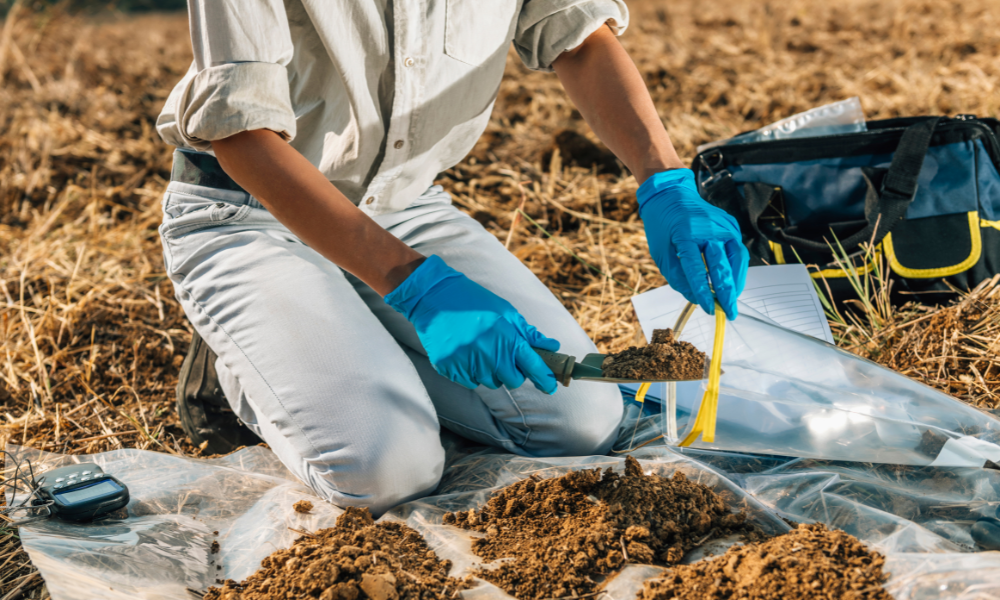In the Ask EnviroStaff blog series, we cover important topics and news related to the environmental industry. Often we highlight important positions in the environmental industry and share their responsibilities, average pay, and the expected growth trajectory. Next up in the series we answer the question, what is a conservation agronomist?
What is a Conservation Agronomist?
In 2021, the agriculture industry in the United States was busy cultivating 895.3 million acres of farmland, or about 52% of the total land in the US, for everything from food to biofuels and numerous innovative end-use products. A career in conservation agronomy is concerned with keeping this land healthy for future generations.
Though conservation has always been important, the last few years have put an emphasis on that point. Now, more than ever, we need to band together to focus on conserving our most valuable resource – the Earth.
Activities related to conservation agronomy like the use of fertilizer and crop rotation have reduced the number of acres devoted to agriculture by about 50 million acres since the year 2000. Even still, the safe, clean, and sustainable use of farmland remains paramount for feeding the world.
According to the US Department of Agriculture, agriculture, food and related industries contributed $1.055 trillion to the US gross domestic product (GDP) in 2020, a 5% percent share. The potential for jobs across the sector, including environmental staffing, is immense.
What is Conservation Agronomy?
Soil contains nutrients that are necessary for plant growth, animal life, and microorganisms. The life cycle comes to a halt if the soil becomes unhealthy, unstable, or polluted. Agronomy is a branch of agriculture that deals with field crop production and soil management. Many large agriculture companies and cooperative operations employ conservation agronomists to ensure the proper use of fertilizers, support regenerative agriculture, and drive sustainability initiatives.
Average Responsibilities and Projected Growth
The term conservation agronomist is not common in the agriculture industry, but it is fast becoming a standard position in agricultural businesses and government conservation and agriculture agencies. A conservation agronomist would be expected to work deliver practical sustainability solutions with the following (whether in the private or public sector):
- Farmers
- Businesses
- Corporate teams
- Outside industry groups
- Customers
- Government agencies
This career often becomes a management role that helps develop, train, and lead an agronomy team to gain proficiency in positioning and engaging farm customers in sustainability and regenerative agriculture. It’s important to “show your work” – so tracking key metrics around sustainability strategy and business goals ensures value and progress to internal and external stakeholders.
A conservation agronomist provides leadership and expertise in the adoption of cropping systems practices that enhance farm resilience and reduce environmental impacts by improving soil health and enhancing ecosystem services in a cost-effective manner.
Conservation agronomists do a lot of work in the field, conducting research on the land or consulting with farmers. They also spend time in offices and research laboratories. An agronomist may specialize in a particular crop or a certain aspect of crop production. For example, developing better methods of growing wheat, preventing soil erosion and agricultural runoff into waterways, or combating weeds, crop diseases and pest infestations.
Necessary Experience and Pay
Experience, paired with an advanced degree, may lead to such positions as manager of a research station, agency administrator or as a project supervisor. Teaching and research positions are available to those who earn a doctoral degree.
Agronomists, who fall under the broader Bureau of Labor Statistics category of “agricultural scientist,” earned a median salary of $68,830 as of May 2020. The lowest-tier agronomists earn less than $40,520, while top-tier agronomists can earn more than $125,280.
If you have a passion for protecting our world’s resources at one of the key stages of development, consider a career as a conservation agronomist. If you need assistance sourcing an employee or a new position, contact EnviroStaff today.

